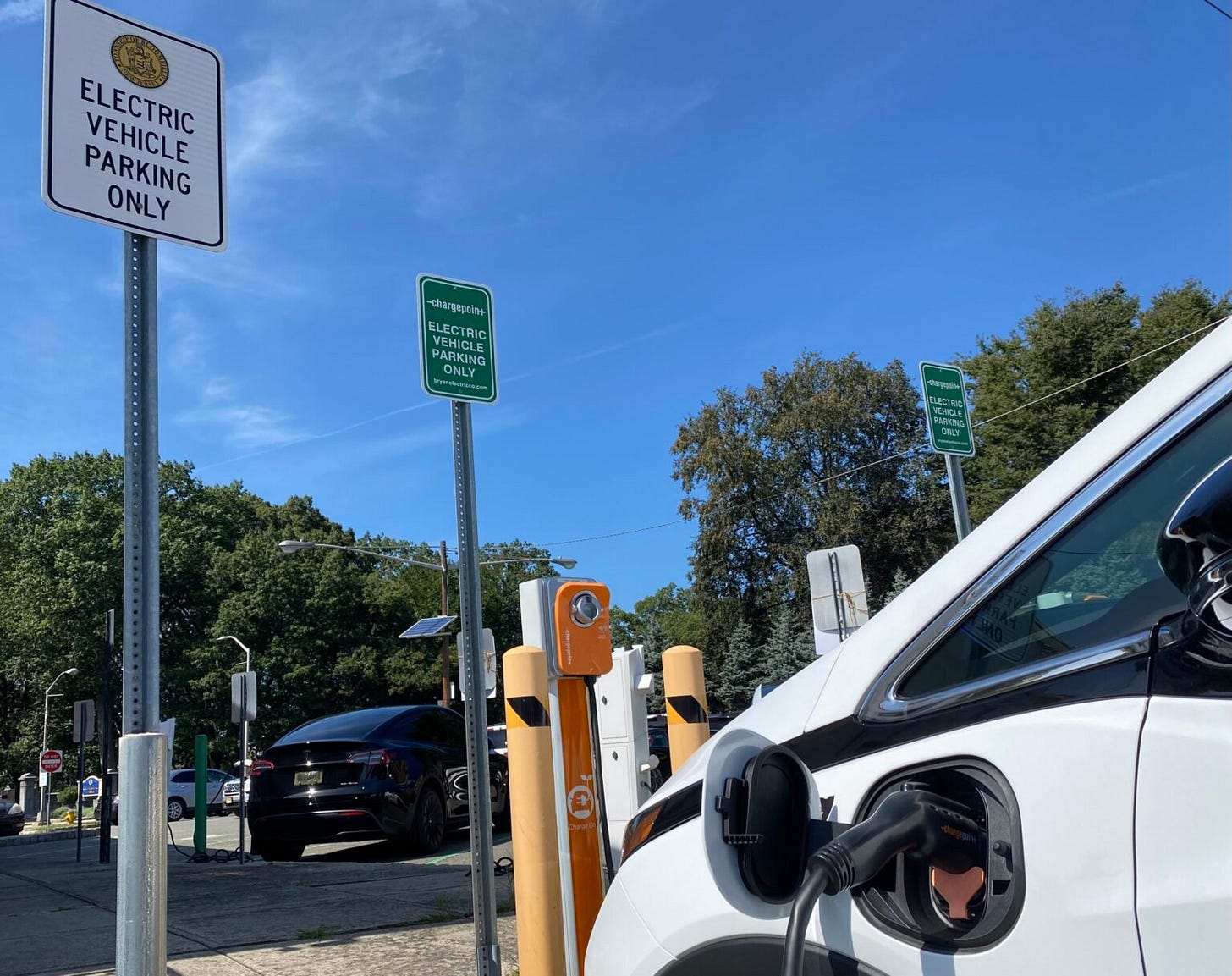Oregon Looks to Expand Per-Mile Charges for Electric Cars as Gas Tax Sputters
Electric vehicles, which have made up about 5% of the cars registered in Oregon in the past decade, aren’t subject to the gas tax.

Oregon recently celebrated registering more than 100,000 electric vehicles, which Gov. Tina Kotek called a “milestone” for reaching the state’s climate goals.
But that milestone can also be a millstone around the neck of the state’s transportation system as lawmakers try to figure out how to produce an estimated $1.8 billion annually for the state’s transportation needs. Sputtering revenue from the state’s 40-cents-per-gallon gas tax as Oregonians drive more fuel-efficient cars — plus rising construction costs tied to inflation — contributed to that deficit.
Electric vehicles, which have made up about 5% of the cars registered in Oregon in the past decade, aren’t subject to the gas tax. They’re subject to higher title and registration fees than gas-powered cars, but the average driver of a gas-powered car still pays more in gas taxes than electric drivers pay in other fees.
In 2015, Oregon became the first state in the nation to launch a voluntary program that allowed drivers to opt into a per-mile charge in exchange for lower DMV fees. But the OReGO program is still rarely used — fewer than 1,000 drivers participate in it — and lawmakers are now looking for ways to expand it to more drivers.
It’s a matter of fairness, according to Jim Whitty, a transportation policy expert who now works in the private sector but spent years developing the OReGO program.
“A road usage charge is necessary because it directly ties the use of roads to what we pay for them,” Whitty told the Joint Transportation Committee. “Once upon a time, Oregon’s fuel tax did this too.”
Sen. Bruce Starr, a Dundee Republican who now serves as vice chair of the committee, anticipated the need for such a charge 24 years ago, when he was in his first term in the House and chaired the transportation committee. During a 2001 hearing, he learned about and test-drove hydrogen-fueled vehicles.
“It opened my eyes to a potential problem of what happens when we don’t fill up vehicles with gasoline,” Starr said.
Starr’s eye-opening experience resulted in Oregon’s response to most problems: a task force. More than a decade later, that task force’s work led to OReGO, which lets electric vehicle owners and those driving cars that get 40 or more miles per gallon save on DMV fees by paying two cents per mile they drive. Other drivers can also sign up for the program and receive a tax credit.
Electric vehicle owners now pay $192 to title their cars, compared with title fees ranging between $101 and $116 for other passenger vehicles. Drivers of electric vehicles pay $316 to register their cars for two years, while other drivers pay between $126 and $156. Enrolling in OReGO can reduce registration fees for electric vehicles to $86.
Drivers who participate in the program sign up with one of two private companies and can use GPS-tracking devices, odometer readings or their car’s computer to track miles driven. The companies bill for those miles — and can subtract miles driven out of state — then take a cut off the top and send the remaining fee to the state.
Tim Martinez, a lobbyist for GeoToll, one of the two companies that operate the OReGO system, also drives an electric vehicle and participates in the program. He said the automatic billing system works well.
“ODOT has created a public-private program that works, and the time is now for this body to scale up the program in a fair and equitable manner,” Martinez said.
Julia Shumway is the Capital Chronicle's editor. Before joining the Capital Chronicle in 2021, she was a legislative reporter for the Arizona Capitol Times in Phoenix and reported on local and state government and politics in Iowa, Nebraska and Bend. An award-winning journalist, Julia also serves as president of the Oregon Legislative Correspondents Association, or Capitol press corps.
Oregon Capital Chronicle is part of States Newsroom, the nation’s largest state-focused nonprofit news organization.
Everyday your story is being told by someone. Who is telling your story? Who are you telling your story to?
Email your sustainable story ideas, professional press releases or podcast submissions to thecontentcreationstudios(AT)gmail(DOT)com.
CLICK HERE FOR SPECIAL PARAMOUNT + DISCOUNT LINK
Paramount+ offers its subscribers a plethora of quality content.
From classic films to banger TV shows like 1883 and Star Trek: Discovery, there’s no shortage of entertainment to explore.
How about some cult favorites like Red Dawn, Grease and There Will Be Blood?
Start Streaming Today!






Thanks, Thomas. I'm an Oregonian but hadn't even heard of this.
The article doesn't mention it, but the real culprit with EVs is their excessive weight compared to what I call 'normal' vehicles. (gas and diesel)
The extra weight increases wear on roads, creates the need for stronger guard rails, and has even cause the collapse of a parking garage.
Source: https://www.axios.com/2023/04/28/evs-weight-safety-problems